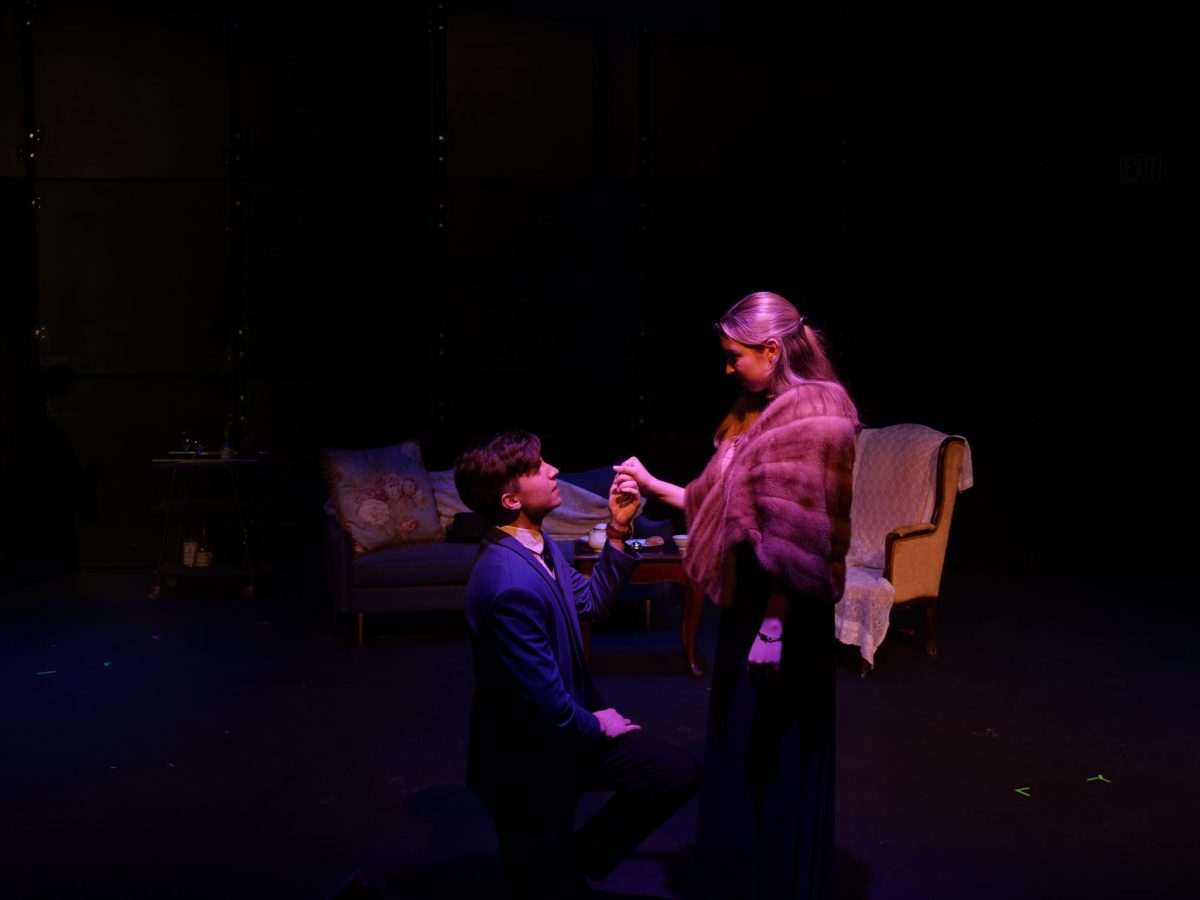Ten minutes before its scheduled start time, the Richard E. Rauh Studio Theatre’s middle section was already full for the opening night of “The Importance of Being Earnest.” Located in the basement of the Cathedral of Learning, the theater’s three-quarter thrust was abuzz with laughs and layered chatters — as if the audience was preemptively celebrating the production it would soon witness.
Performance Collaborative’s production of Oscar Wilde’s 1895 satirical comedy ran from Jan. 26 through Jan. 28. The play follows two friends, Jack Worthing and Algernon Moncrieff, as they navigate their social lives via fictional personas. Jack embodies Ernest Worthing when he is in London, and Algernon feigns visiting his nonexistent friend Bunbury when he wishes to avoid social engagements. Algernon’s interest in Jack’s adoptee, Cecily Cardew, complicates their double lives as Algernon tells Cecily that he is Jack’s brother Ernest, whom he visits often in the city. The arrival of Jack’s fiancee, Gwendolen Fairfax, further sullies the men’s scheme by forcing them to confront the uncomfortable question — who is truly engaged to Ernest Worthing?
Prior to the pandemic, Performance Collaborative primarily focused on student-written works, featuring showcases of one-act plays and the occasional full production of original work.
A lack of desire to perform plays over Zoom — a format devoid of palpable chemistry and true eye contact — lead to the organization’s disbandment during the COVID-19 pandemic.
Victoria Murphy, a sophomore political science and theater arts major and president of Performance Collaborative, was involved in the Pitt Musical Theatre Club and Redeye Theatre Project, a comedy-focused endeavor. She felt that even with these theater and performance opportunities, she was missing something that focused on plays. After speaking to Performance Collaborative’s former vice president, Adam Nye, she resolved to restart the organization last year but with less emphasis on student-written projects, focusing instead on established plays to lure in more members.
The selection of “The Importance of Being Earnest” was an easy choice for the organization’s first full-length production — it’s a classic work of theater. However, Murphy said acquiring the means for executing this production required frugality and resourcefulness.
“We spent about $50 on that whole show. Everything else was from students’ closets,” Murphy said. “Our costume designer works in the Pitt costume shop and got a bunch of hats for us. All of the set pieces were from the Pitt Theatre Department — they lent to us for free.”
The Performance Collaborative board chose director Tamanna Khan, a junior global studies, political science and theater major, due to her distinct directorial style. She assembled a mood board for her pitch that aimed to represent her vision for a minimal set, rather than the more typical slice of life design.
“I saw Performance Collaborative as an opportunity to direct and be creative, but I knew that there were different constraints. I wanted it to fit my dramatic interpretation of the text which was more abstract,” Khan said. “While I kept a lot of the historical themes of the time, of that Victorian era, I didn’t make it the focus. I made the focus the relationships between the different characters, the story that develops, and the comedy.”
The colors reflect the characters’ moods — warm-hued versus cool-toned lighting brought abstraction to life. Khan furthered her directive intentionality through props — every object on stage felt the gentle and tender touch of the actors boldly forgoing decoration. Although Khan first read the play in high school, Khan fell in love with Wilde’s comedy during her reread in preparation for this production.
“Being on this production made me see that this is something I could see myself doing for the rest of my life,” Khan said.
Preparation for this production was intensive — four-hour rehearsals for the first three weeks of the semester. Even after the actors mastered their blocking and lines, there were other important decisions to make. Should they break up the two-hour run time with an intermission? How would they maintain their hold on the audience during moments of transition?
During wet tech, a technical rehearsal of the production, Murphy, Khan and stage manager Gabriella Walko recognized that they had to maintain the audience’s engagement.
“[The set changes] were really long and I was kind of getting bored during them because they were just picking up furniture and leaving,” Murphy said.
As a result, the group decided to include intermittent comedic skits during set changes, which Murphy hailed as “one of the favorite parts from the audience.”
Beginning with improv, assistant stage managers Elena Wenrich-Quiñones and Jared Donelson mapped out and choreographed how they would interact with every piece of furniture. Isabel Sichlau, a junior learning sciences and psychology major, highlighted the surprises of the performance and the stage crew as shining moments for the production.
“This was so much fun! [The audience’s energy] was super positive and it was so fun seeing everyone’s reactions to their friends onstage,” Sichlau said.
Some audience members mentioned CJ Lande’s performance as Lady Bracknell. Patrick Francis, a senior political science and English literature major, described it as “incredibly funny.”
“It’s my favorite play that I’ve seen at Pitt so far this year,” Francis said. “It’s interesting how Wilde’s dialogue, despite being from the 1890s, still can be funny to this day.”



